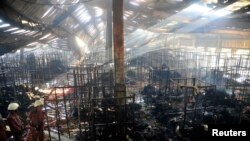GENEVA —
Bangladesh must improve conditions in its garment industry, in which hundreds have died in factory fires, if it is to maintain economic growth, a U.N. report said on Monday.
The International Labor Organization (ILO) said it must also improve education and create more full-time jobs for young people to stop them from emigrating and draining the labor pool.
“Unless a comprehensive set of labor market and social policies are introduced, [Bangladesh] will be unable to maintain its economic momentum and improve living standards in a sustainable way,” the report said.
Important steps had been made towards an open economy, the ILO noted.
The report, two years in the making, was issued as Bangladesh suffers major labor unrest in the garment industry - a major source of clothing for European and North American markets and the mainstay of its export-led growth - and faces pressure from Western nations regarding factory conditions.
In April of this year, a fire at one garment complex employing mainly women just outside Dhaka killed 1,129 people. Just months before, in 2012, 117 workers died in another factory blaze, partly attributed to shoddy building standards.
Presenting the report at a Geneva news conference, ILO officials said that it was not originally linked to these disasters, as it had been started back in 2011. However, they also said the report reflected the situation that led to the incidents.
The report said the rise of Bangladesh's ready-made garments industry over the past two decades had brought it to account for 4.8 per cent of global apparel exports, second only to China, from 0.6 per cent in 1990.
Unregulated Growth
“But unregulated industry growth has contributed to poor working conditions in the sector, which have acted as an obstacle to sustainable development,” the ILO said.
Although in the past six months, the government had taken some action to address health and safety issues, poor conditions remain a challenge in many factories.
National estimates say poverty has declined, according to the report, but as of 2010 some 76 per cent of the population of around 151 million were living on less than $2 a day, the highest level in the region, according to the report.
In the garment sector, which employs about 3.6 million people, wages were the lowest among Bangladesh's regional export competitors - well below what workers in Cambodia, India, Pakistan, Sri Lanka and Vietnam could earn.
Currently, Western companies who are major purchasers of the sector's products - like U.S.-based giant Wal-Mart, France's Carrefour and Spain's El Corte Ingles - are in discussions with the Bangladesh government, companies and unions on compensation for workers who died in the April fire.
The discussions are being conducted under the auspices of the European Union which, like the United States, has warned that concrete steps must be taken to improve how the industry operates.
However, talks have failed to produce an outline agreement satisfying all participants.
Some U.S. companies say they prefer to negotiate directly, while manufacturers in Bangladesh are nervous about an accord that would bind them in the future.
The International Labor Organization (ILO) said it must also improve education and create more full-time jobs for young people to stop them from emigrating and draining the labor pool.
“Unless a comprehensive set of labor market and social policies are introduced, [Bangladesh] will be unable to maintain its economic momentum and improve living standards in a sustainable way,” the report said.
Important steps had been made towards an open economy, the ILO noted.
The report, two years in the making, was issued as Bangladesh suffers major labor unrest in the garment industry - a major source of clothing for European and North American markets and the mainstay of its export-led growth - and faces pressure from Western nations regarding factory conditions.
In April of this year, a fire at one garment complex employing mainly women just outside Dhaka killed 1,129 people. Just months before, in 2012, 117 workers died in another factory blaze, partly attributed to shoddy building standards.
Presenting the report at a Geneva news conference, ILO officials said that it was not originally linked to these disasters, as it had been started back in 2011. However, they also said the report reflected the situation that led to the incidents.
The report said the rise of Bangladesh's ready-made garments industry over the past two decades had brought it to account for 4.8 per cent of global apparel exports, second only to China, from 0.6 per cent in 1990.
Unregulated Growth
“But unregulated industry growth has contributed to poor working conditions in the sector, which have acted as an obstacle to sustainable development,” the ILO said.
Although in the past six months, the government had taken some action to address health and safety issues, poor conditions remain a challenge in many factories.
National estimates say poverty has declined, according to the report, but as of 2010 some 76 per cent of the population of around 151 million were living on less than $2 a day, the highest level in the region, according to the report.
In the garment sector, which employs about 3.6 million people, wages were the lowest among Bangladesh's regional export competitors - well below what workers in Cambodia, India, Pakistan, Sri Lanka and Vietnam could earn.
Currently, Western companies who are major purchasers of the sector's products - like U.S.-based giant Wal-Mart, France's Carrefour and Spain's El Corte Ingles - are in discussions with the Bangladesh government, companies and unions on compensation for workers who died in the April fire.
The discussions are being conducted under the auspices of the European Union which, like the United States, has warned that concrete steps must be taken to improve how the industry operates.
However, talks have failed to produce an outline agreement satisfying all participants.
Some U.S. companies say they prefer to negotiate directly, while manufacturers in Bangladesh are nervous about an accord that would bind them in the future.







